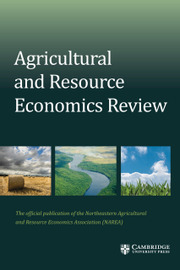Article contents
Supply Response and Impact of Government-Supported Crops on the Texas Vegetable Industry
Published online by Cambridge University Press: 15 September 2016
Abstract
Supply functions, elasticity estimates, and nonjointness test results consistently indicated that few commodities compete economically in the production of six major Texas vegetables (cabbage, cantaloupes, carrots, onions, potatoes, and watermelons). Significant bias effects caused by government-supported commodities, fixed inputs, and technological change were observed and measured. Nonnested test results for the hypothesis of sequential decision making by vegetable producers were inconclusive, but they gave greater likelihood support to sequential than to contemporaneous decision making.
- Type
- Articles
- Information
- Copyright
- Copyright © 1993 Northeastern Agricultural and Resource Economics Association
References
- 3
- Cited by


